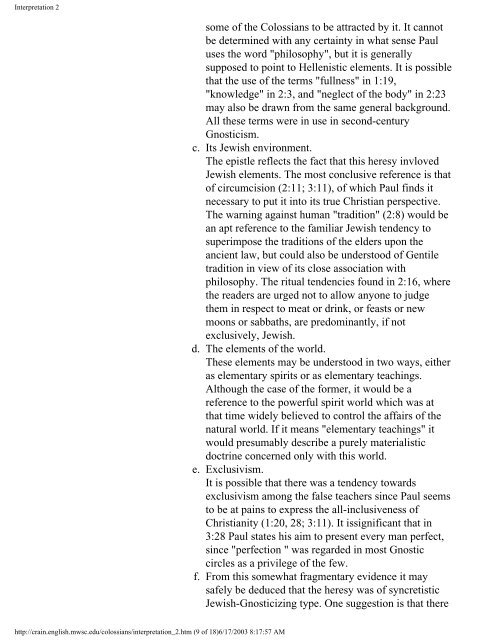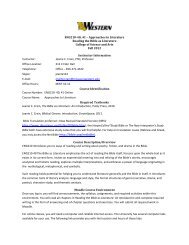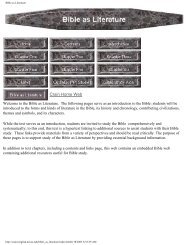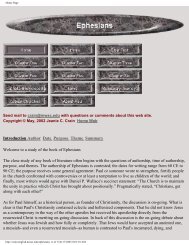Introduction to Colossians: Authorship, Date, Audience - Crain Home
Introduction to Colossians: Authorship, Date, Audience - Crain Home
Introduction to Colossians: Authorship, Date, Audience - Crain Home
Create successful ePaper yourself
Turn your PDF publications into a flip-book with our unique Google optimized e-Paper software.
Interpretation 2<br />
http://crain.english.mwsc.edu/colossians/interpretation_2.htm (9 of 18)6/17/2003 8:17:57 AM<br />
some of the <strong>Colossians</strong> <strong>to</strong> be attracted by it. It cannot<br />
be determined with any certainty in what sense Paul<br />
uses the word "philosophy", but it is generally<br />
supposed <strong>to</strong> point <strong>to</strong> Hellenistic elements. It is possible<br />
that the use of the terms "fullness" in 1:19,<br />
"knowledge" in 2:3, and "neglect of the body" in 2:23<br />
may also be drawn from the same general background.<br />
All these terms were in use in second-century<br />
Gnosticism.<br />
c. Its Jewish environment.<br />
The epistle reflects the fact that this heresy invloved<br />
Jewish elements. The most conclusive reference is that<br />
of circumcision (2:11; 3:11), of which Paul finds it<br />
necessary <strong>to</strong> put it in<strong>to</strong> its true Christian perspective.<br />
The warning against human "tradition" (2:8) would be<br />
an apt reference <strong>to</strong> the familiar Jewish tendency <strong>to</strong><br />
superimpose the traditions of the elders upon the<br />
ancient law, but could also be unders<strong>to</strong>od of Gentile<br />
tradition in view of its close association with<br />
philosophy. The ritual tendencies found in 2:16, where<br />
the readers are urged not <strong>to</strong> allow anyone <strong>to</strong> judge<br />
them in respect <strong>to</strong> meat or drink, or feasts or new<br />
moons or sabbaths, are predominantly, if not<br />
exclusively, Jewish.<br />
d. The elements of the world.<br />
These elements may be unders<strong>to</strong>od in two ways, either<br />
as elementary spirits or as elementary teachings.<br />
Although the case of the former, it would be a<br />
reference <strong>to</strong> the powerful spirit world which was at<br />
that time widely believed <strong>to</strong> control the affairs of the<br />
natural world. If it means "elementary teachings" it<br />
would presumably describe a purely materialistic<br />
doctrine concerned only with this world.<br />
e. Exclusivism.<br />
It is possible that there was a tendency <strong>to</strong>wards<br />
exclusivism among the false teachers since Paul seems<br />
<strong>to</strong> be at pains <strong>to</strong> express the all-inclusiveness of<br />
Christianity (1:20, 28; 3:11). It issignificant that in<br />
3:28 Paul states his aim <strong>to</strong> present every man perfect,<br />
since "perfection " was regarded in most Gnostic<br />
circles as a privilege of the few.<br />
f. From this somewhat fragmentary evidence it may<br />
safely be deduced that the heresy was of syncretistic<br />
Jewish-Gnosticizing type. One suggestion is that there






![[38cb1273][0][sourcelist][1][0] - Crain Home](https://img.yumpu.com/2168350/1/190x245/38cb12730sourcelist10-crain-home.jpg?quality=85)